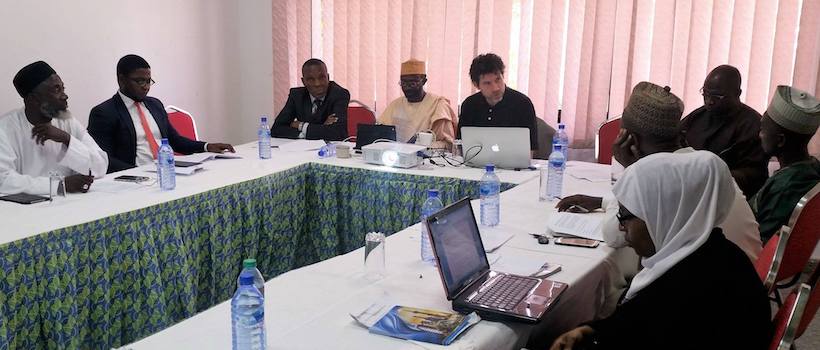- Home
- Center for Peace, Democracy & Development
- Key Areas
- Democratic Development
Democratic Development
Public Participation and Dialogue for More Responsive Governance

Our democracy-based work is grounded in the belief that more capable and accountable governments are integral to the development of democratic nations. We aim to foster greater public participation and dialogue in decision-making and increase the responsiveness of national and local governments to human security needs.
Our scholar-practitioners have been working on democratic development in Africa and other regions of the world since 1987. Through our work, we aim to expand and strengthen democratic institutions and practices. Led by Senior Faculty Fellow and Advisor: Malcolm Russell-Einhorn; projects and themes include:
Strengthening Rwandan Administrative Justice (SRAJ) Project
Themes: Strengthening local government; evidence-based needs assessment for government capacity-building; public participation in policymaking; strengthening formal dispute resolution processes; use of mass media coverage to improve public's rights awareness.
Cross-listing: This project is cross-listed under Law and Justice System Reform. Please refer to that listing for more information.
Public Participation and Responsive Governance
Effective democratic governance depends on robust and well-institutionalized public participation mechanisms that generate valuable data and diverse policy perspectives, increase pressures for accountability, and allow societies to respond effectively to natural and man-made crises. CPDD works with local and national governments to expand and improve deliberative spaces and public participation mechanisms; promote more open, legally-grounded, and evidence-based policymaking processes; establish more effective and socially accountable oversight mechanisms; promote innovative, efficient, and transparent modes of government regulation; and harness accessible technologies to improve governance service delivery.
Conflict Resolution Systems:
Media Development
Economic Development and Access to Education
CPDD believes in the intrinsic relationship between the development of democratic institutions and sound economies. We are therefore committed to rural development and market systems development, building on the earlier foundation of Making Markets Work for the Poor (W4P) programs. This agenda is predicated on sound participatory community development initiatives as well as administrative justice and regulatory mechanisms that facilitate access and transparency. In addition, vibrant national democracies and economies necessitate youth access to education so that young people can secure appropriate future livelihoods in an increasingly interdependent world. We therefore collaborate with universities and other training institutions to develop programs that prepare young people for professional participation in a global economy and civic participation in more complex governance contexts and public management systems.
LIBERIA Media, Education, and Workforce Development
WEST AFRICA Media Business Development Niger
Building on its multi-year support for the media in Liberia, CDD expanded its contacts with the media into Francophone countries. Under invitation from the U.S. State Department, CPDD's Michael Keating gave a series of lectures and seminars on media business development to journalists and media managers in Niger, Burkina Faso and Cote D'Ivoire. The goal of the project was to introduce digital media concepts into traditional media houses. As a result, it introduced locally appropriate good business practices and demonstrated how social media could be integrated into the newsroom. Through the project, CDD also built working relationships between UMass Boston and institutes of higher learning throughout West Africa.
SENEGAL Saint-Louis Regional Community Resource Center Sustainability Initiative
With a three-year USAID Education for Democracy and Development (EDDI) grant, CDD partnered with the Universite Gaston Berger de Saint-Louis and its local communities to develop a multi-functional community resource center for the purpose of making the Universite's resources more available to its surrounding communities. In the late 1990s, senior university staff from Gaston Berger visited UMass Boston in the late 1990s under a CDD Partnership for Higher Education project. As part of that program, the Senegalese visitors were introduced to American urban public university-style community outreach, engagement, and empowerment. During subsequent visits to Gaston Berger, CDD fellows continued discussions with their Senegalese counterparts about how Gaston Berger might expand its role and self-image beyond traditional classroom-based teaching and develop more community-oriented social and economic development programs. As a result of these interactions, the Universite Gaston Berger de Saint Louis designed and built a physical building on community-donated land across the main road from its campus. The building space was designed for small business use, a café, an internet café, a business resource center, a women’s center, classrooms, and other functions. The Universite also established mini-bus service from the Community Resource Center/Gaston Berger to Saint Louis, Senegal's old French colonial capital located 15 km west of the campus.